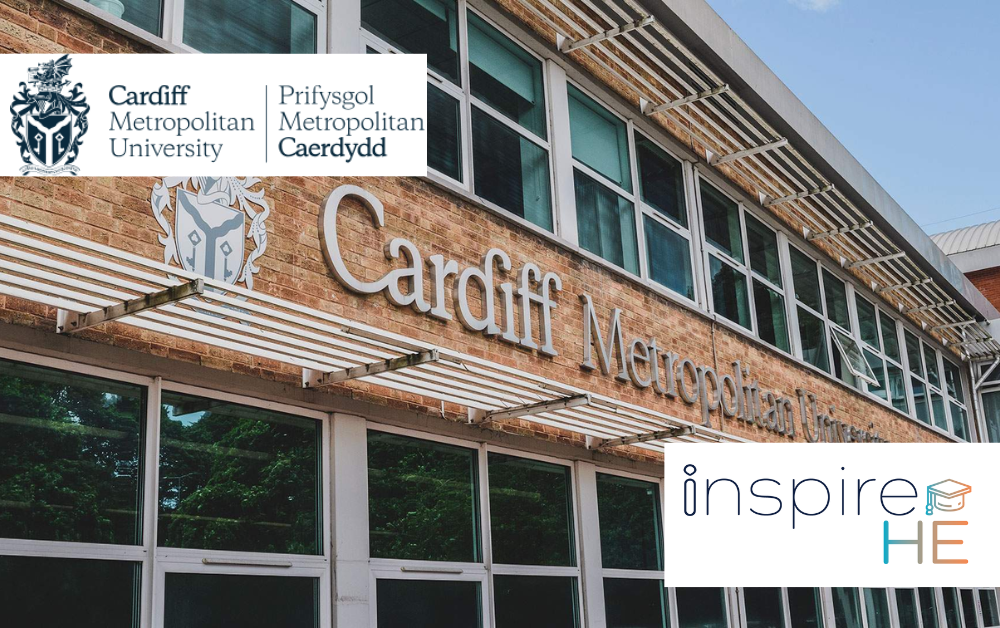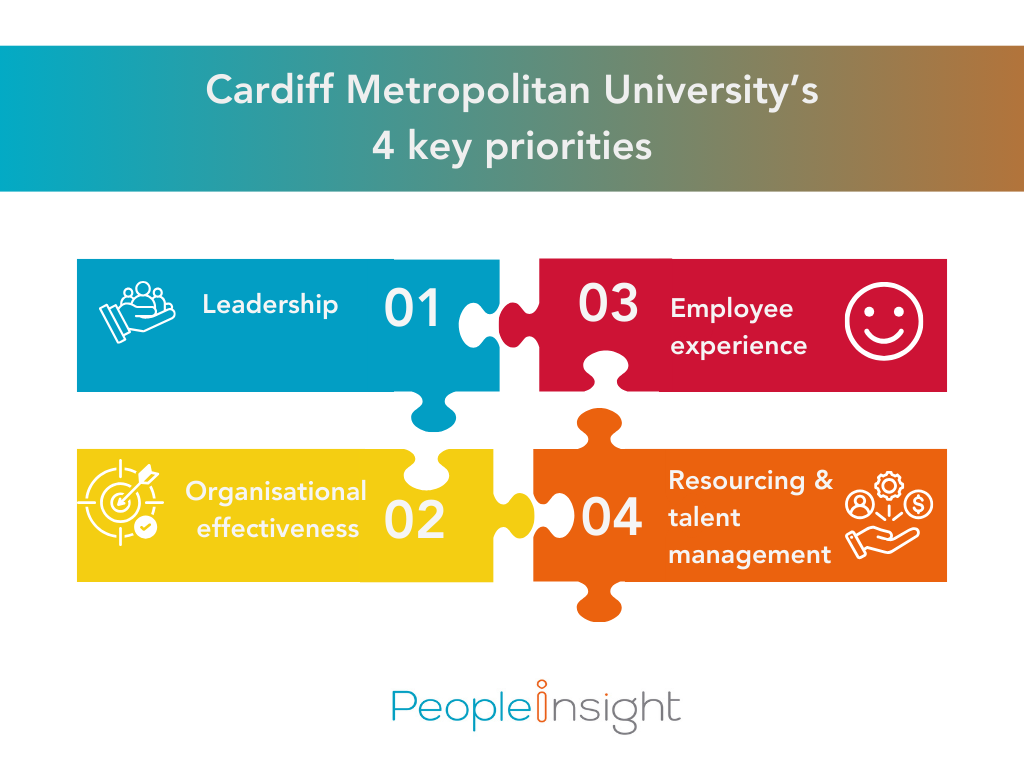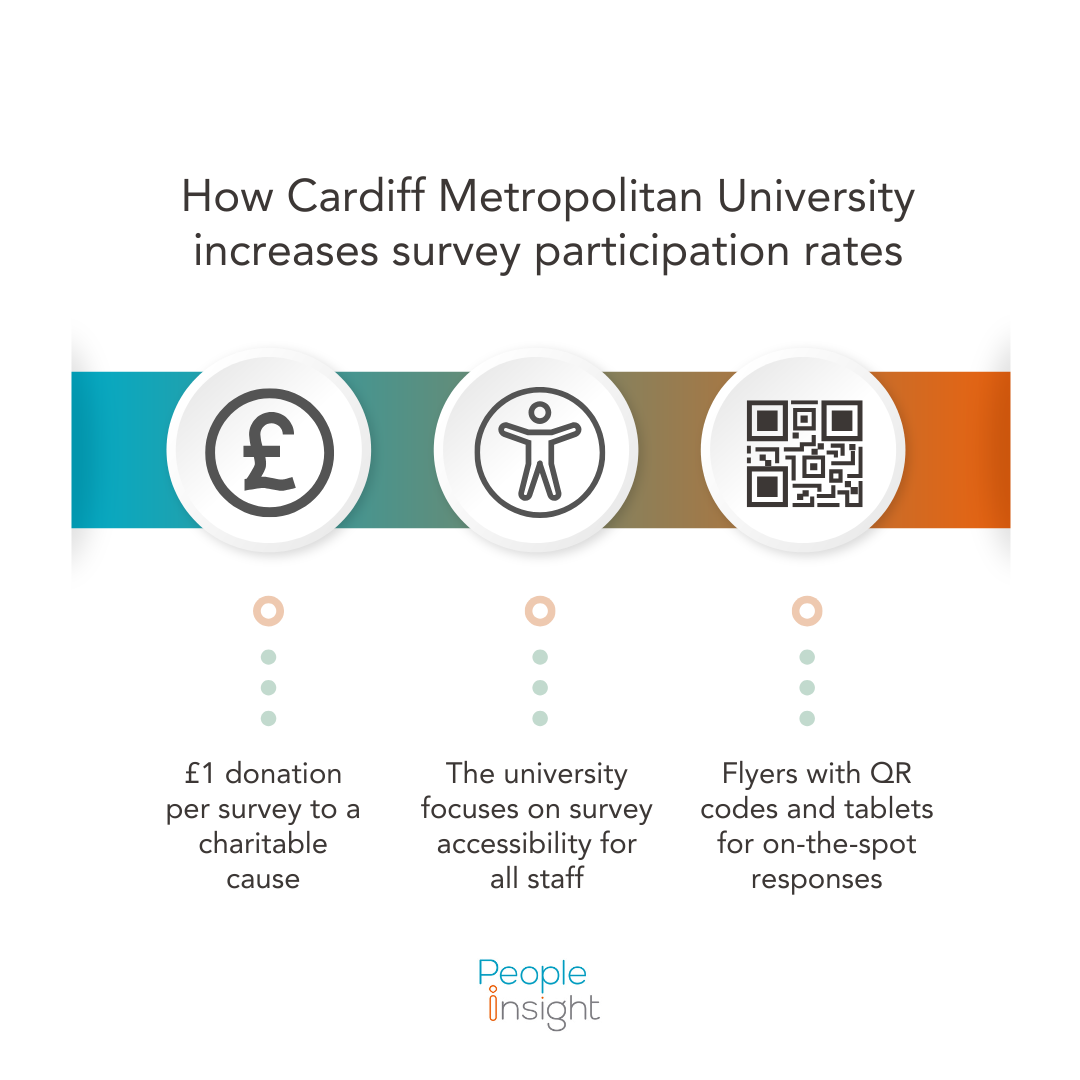
At Cardiff Metropolitan University, creating a great employee experience isn’t an afterthought. It’s embedded in the way the university operates every day. That commitment was recently recognised with a top quartile ranking in the Inspire HE rankings, which celebrates higher education institutions that go above and beyond for their staff.
This recognition reflects more than just good practice. For Cardiff Met, listening to staff and acting on their feedback is part of business as usual. This achievement marks them as one of the top HE employers in the UK. Let’s see how they put people at the centre of what they do.
Read more: Introducing Inspire HE: University ranking for employee experience
Cardiff Met’s focus on employee experience is deeply rooted in its People Enabling Strategy — a key driver of staff engagement and institutional performance. In fact, one of the university’s top-level KPIs is its staff engagement score compared to the wider HE sector benchmark, showing just how central this is to the institution’s success.
The strategy outlines four key priorities: 
Each area contributes to the bigger picture — whether it’s promoting an inclusive culture, building strong support systems or ensuring the right people are recruited and developed to thrive at the university.
Together, these pillars create a strong foundation for a workplace where people feel supported, connected and empowered to perform at their best.
Cardiff Met doesn’t rely on a single method to understand its staff. Its approach to employee voice is multi-layered, thoughtful and ongoing.
Every two years, all core staff are invited to complete a comprehensive employee survey that covers 15 key themes from leadership and wellbeing to flexible working and communication. But the listening doesn’t stop there. The university follows up with drop-in sessions to explore emerging issues in more detail and provides a digital suggestion box for ongoing feedback.
Staff participation is encouraged in a number of creative ways:

Crucially, the campaign is led from the top. For example, The Vice-Chancellor launched their 2024 survey with a live virtual event, and senior leaders are kept closely involved throughout, helping to drive visibility and engagement.
Listening is only valuable when it leads to meaningful change — and Cardiff Met has made sure that staff feedback directly shapes decision-making.
Insights from the survey and drop-in sessions have informed the university’s transformation programme. As well as the university’s future review of its workload allocation model. Schools and professional services have been given access to survey dashboards to help develop local action plans.
Work is also underway on a new leadership practices framework, designed to clarify what great leadership looks like at Cardiff Met. Alongside that, the university has introduced its Future Met Culture Map — a shared vision for how staff work together and support each other, which is being embedded across teams and reflected in appraisal and induction processes.
Staff feedback has also played a vital role in shaping Cardiff Met’s new dignity and respect policy, co-created with input from both employees and students. It’s a strong example of the university’s commitment to creating a culture where everyone feels respected, safe and heard.
When it comes to priorities, several themes consistently rise to the surface. Staff have made it clear that wellbeing, inclusion, dignity and respect, and having their voice heard are all essential to their experience at work. They also want opportunities to develop and feel a sense of personal fulfilment in their roles.
These themes aren’t just part of the university’s formal strategy — they’re reflected in everyday conversations, staff-led initiatives, and how the organisation evolves.
While the full impact of recent initiatives won’t be measurable until the next survey in 2026, early feedback has been promising.
Staff attending the drop-in sessions praised the university’s openness and transparency, highlighting how communication has improved and how leadership feels more connected and approachable.
One staff member commented, “Keep doing what you are doing – transparency, clarity and honesty. These are some of the values I’ve seen from the University Executive Group over the past 12 months and it’s been fantastic.”
Another added, “Continued consultation and communication with staff on changes and developments” as a clear sign that things were moving in the right direction.
Externally, Cardiff Met has also seen encouraging signs. The university was named one of the top three in Wales by StudentCrowd in 2024 and achieved its highest-ever position in The Times & Sunday Times Good University Guide 2025, making it the biggest climber in Wales.
Of course, no strategy is without its challenges. Running a major staff survey during a particularly turbulent time for the higher education sector wasn’t easy. Sustaining high levels of participation and keeping momentum between surveys also remains an ongoing focus.
What has helped is regular, transparent communication — through the staff intranet, in meetings and via updates from senior leaders. Union representatives, governors and staff networks have also been key partners in ensuring feedback is acted upon.
The emphasis on visibility, authenticity and follow-through has been critical in building trust.
Cardiff Met is already planning the next phase of its employee experience journey. A new pulse survey will offer more frequent check-ins with staff, helping the university stay responsive and agile.
In-person engagement will also be expanded, with cultural initiatives like the Ways of Working framework, the new Dignity and Respect policy, and clear Leadership Expectations being shared and discussed through team meetings across the university.
A refreshed People and Culture Directorate will help lead this work, guided by a vision to build a thriving, inclusive community where staff feel valued, supported and proud of what they do. The ambition is to create a workplace that supports flexible, fulfilling work and helps everyone live healthier, happier lives — both inside and outside of the university.
Cardiff Metropolitan University’s top-tier performance in the Inspire HE rankings is no accident. It reflects a sustained, thoughtful approach to listening, learning and leading with people at the centre.
By translating feedback into action and embedding employee voice in its strategy, Cardiff Met is building not just a better workplace — but a stronger, more connected institution for the future.
Here at People Insight, we work with leading HEIs like Cardiff Met to measure the employee experience, while offering meaningful actions for improvement.
If you want to join the ranks of Cardiff Metropolitan University and create an inspirational employee experience for your team, get in touch with us today to arrange a higher education staff survey.
Check out our other Inspire HE case studies and see how they’re putting measures in place to ensure an incredible employee experience for their people: